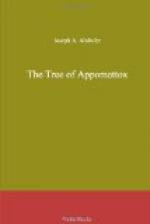They bore him away when the
day had fled,
And the storm
was rolling high,
And they laid him down in
his lonely bed
By the light of
an angry sky.
The lightning flashed and
the wild sea lashed
The shore with
its foaming wave,
And the thunder passed on
the rushing blast
As it howled o’er
the rover’s grave.
He knew that voice. He had heard it years ago, a century it seemed. It was the voice of a friend, the voice of Sam Jarvis, the singer of the mountains. He rushed forward, but overtaxing his strength, fell. He pulled himself up by a bush and stood, trembling with weakness and anxiety. Still came the voice, but the song had changed:
Soft o’er the fountain, lingering
falls the Southern moon,
Far o’er the mountain breaks the
day too soon,
In thy dark eyes’ splendor, where
the warm light loves to dwell,
Weary looks yet tender speak their fond
farewell,
Nita! Juanita! Ask thy soul
if we should part,
Nita! Juanita! Lean thou on
my heart!
It was an old song of pathos and longing, but Harry remembered well that mellow, golden voice. If he could reach Sam Jarvis he would secure help, and there was the happy valley in which he lived. As he steadied himself anew fresh strength and courage poured into his veins, and leaving the fringe of forest he entered a field, at the far end of which Jarvis was ploughing.
The singer was happy. He drove a stout bay horse, and as he walked along in the furrow he watched the rich black earth turn up before the ploughshare. He hated no man, and no man hated him. The war had never invaded his valley, and he sang from the sheer pleasure of living. The world about him was green and growing, and the season was good. His nephew, Ike Simmons, was ploughing in another field, and whenever he chose he could see the smoke rising from the chimney of the strong log house in which he lived.
Harry thought at first that he would go down the end of the long field to Jarvis, but the ploughed land pulled at his feet, and made him very weak again. So he walked straight across it, though he staggered, and approached the house, the doors of which stood wide open.
He was not thinking very clearly now, but he knew that rest and help were at hand. He opened the gate that led to the little lawn, went up the walk and, scarcely conscious of what he was doing, stood in the doorway, and stared into the dim interior. As his eyes grew used to the dusk the figure of an old, old woman, lean and wrinkled, past a hundred, suddenly rose from a chair, stood erect, and regarded him with startled, burning eyes.
“Ah, it’s the governor, the great governor, Henry Ware!” she exclaimed. “Didn’t I say to you long ago: ’You will come again, and you will be thin and pale and in rags, and you will fall at the door.’ I see you coming with these two eyes of mine!”




